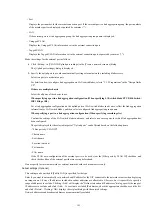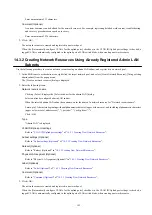
4.
Release maintenance mode.
This step is not required if the [Release from Maintenance Mode after deployment] checkbox was enabled in the [Deploy a Cloning
Image] dialog.
a.
In the ROR console server resource tree, right-click the source server (or its physical OS) and select [Maintenance Mode]-
[Release] from the popup menu.
The [Release Maintenance Mode] dialog is displayed.
b.
Click <OK>.
The target server is released from maintenance mode.
Note
-
When deploying a cloning image that was collected from a Windows server, the following information is reset on each destination
server. This is a result of the execution of Microsoft's System Preparation (Sysprep) tool.
If necessary, restore the following settings to their original values after the cloning image has been deployed:
-
Desktop icons and shortcuts
-
Drive mappings
-
The "Startup and Recovery" settings accessed from the [Advanced] tab of the [System Properties] window
-
Virtual memory settings
-
TCP/IP-related settings
-
The "What country/region are you in now?" settings in the locations defined in the [Location Information] window
-
Disk quota settings
-
Storage Provider settings
-
Microsoft Internet Explorer settings (RSS feeds subscription information, information stored by the Autocomplete function, saved
passwords)
-
Microsoft Outlook Express settings (mail/directory server passwords)
-
Network card driver settings (drivers without a digital signature should be replaced by the latest updated drivers with a digital
signature)
-
Access rights to the '\Documents and Settings\Default User' folder
-
While a cloning image is being deployed, collection, deployment, and deletion cannot be performed simultaneously on the cloning
images with the same name.
-
If a cloning image is deployed to a system with a larger disk capacity than the disk space required for the cloning image, any excessive
disk space becomes unused disk space. This unused disk space can be used for other purposes.
-
Destination servers are rebooted several times during cloning image deployment. Make sure that deployment has completed before
restarting operations and making further settings.
-
The number of reboots during deployment increases when using the HBA address rename function.
-
If activation of Windows Server 2008 or later failed during deployment, message number 47233 is displayed.
This message indicates that deployment of Windows Server 2008 or later completed, but activation failed.
For details on the appropriate corrective action, refer to "Message number 47233" in "Messages".
-
When a cloning image is deployed to multiple servers, it may be necessary to enable IGMP snooping on admin LAN switches. If
IGMP snooping is not enabled, transfer performance may deteriorate when ports with different speeds co-exist in the same network,
or multiple image operations are run simultaneously.
- 130 -
















































